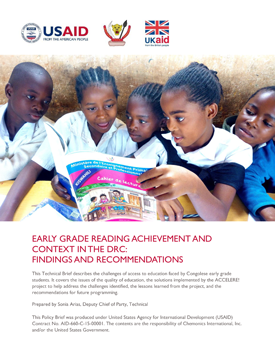In a country where more than 7 million children are not currently in school, a systematic effort is targeting the primary education sector to help close that gap.

Early Grade Reading Achievement and Context in the Democratic Republic of the Congo: Findings and Recommendations .
Technical Brief | July 13, 2020

This Technical Brief describes the challenges of access to education faced by Congolese early grade students. It covers the issues of the quality of education, the solutions implemented by the ACCELERE! project to help address the challenges identified, the lessons learned from the project, and the recommendations for future programming.
ACCELERE!1 A!1 improves educational outcomes for girls and boys through improved teaching and learning in national languages (Kiswahili, Ciluba, Lingala) and French, reducing barriers to education, and increasing transparency of school governance structures. In support of the GDRC’s effort to improve education access and quality, in 2015 USAID and UKAID launched the US$133 million ACCELERE!1 (A!1) program to improve learning outcomes for students in formal and accelerated learning programs. In preparation for A!1, a third-party evaluator conducted a baseline Early Grade Reading Assessment (EGRA). The assessment found that pre-reading and reading skills in three national languages (Kiswahili, Lingala, Ciluba) for Grade 3 students and in French for Grade 5 students had not changed much from the 2013 assessment and were not sufficient to enable them to read with comprehension at grade level. Even at Grade 5, students were only reading an average of 11 correct words per minute. This technical brief describes the challenges of access to education faced by Congolese early grade students. It covers the issues of the quality of education, the solutions implemented by the ACCELERE! project to help address the challenges identified, the lessons learned from the project, and the recommendations for future programming.
